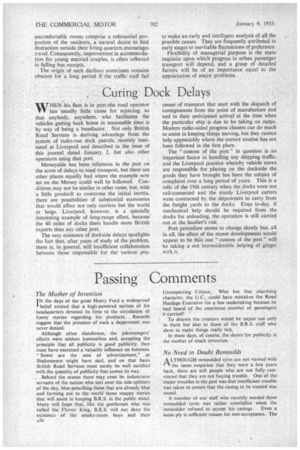. Curing Dock Delays
Page 28

If you've noticed an error in this article please click here to report it so we can fix it.
W HEN his has usually little cause for rejoicing, so fleet is in port-the road operator that anybody, anywhere, who facilitates the vehicles getting back home in reasonable time is by way of being a benefactor. Not only British Road Services is deriving advantage from the system of radio-van dock patrols, recently instituted at Liverpool and described in the issue of • this journal dated January 2, but also other operators using that port.
Merseyside has been infamous in the past on the score of delays to road transport, but there are other places equally bad where the example now set on the Mersey could well be followed. Conditions may not be similar in other cases, but, with a little goodwill to overcome the initial inertia, there are possibilities of substantial economies that would affect not only carriers but the world at large. Liverpool, however, is a specially interesting example of long-range effect, because' the 40 miles of docks there handle more British exports than any other port.
The very existence of dockside delays spotlights the fact that, after years of study of the problem, there is, in general, still insufficient collaboration between those responsible for the various pro cesses of transport that start with the dispatch of consignments from the point of manufacture and end in their anticipated arrival at the time when the particular ship is due to be taking on cargo. Modern radio-aided progress chasers can do much to assist in keeping things moving, but they cannot help appreciably where the correct routine has not been followed in the first place.
The "custom of the port" in question is an important factor in handling any shipping traffic, and the Liverpool practice whereby vehicle crews are responsible for placing on the dockside the goods they have brought has been the subject of complaint over a long period of years. This is a relic of the 19th century when the docks were not rail-connected and the sturdy Liverpool carters were contracted by the shipowners to carry from the freight yards to the docks. Even to-day, if mechanical help should be required from the docks for unloading, the operation is still carried out at the haulier's risk.
Port procedure seems to change slowly but, all in all, the effect of the recent developments would appear to be that one "custom of the port" will be taking a not inconsiderable helping of ginger with it.












































































































































































